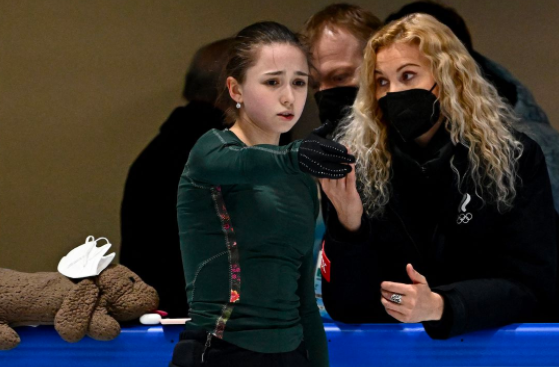Written by: Caitlin Gann, Staff Writer
HYPOCRISY: 15-Year-Old Tests Positive for Doping.
The 2022 Winter Olympics has created much controversy, from human rights issues in China to doping dramatics from the Russian Olympic Committee, and now the current situation with Russia and Ukraine. One of the more controversial events that happened in the Winter Olympics is the doping scandal with 15-year-old figure skater Kamila Valieva. Russia was banned from the Olympics for four years in December of 2019 by the World Anti-Doping Agency after Russia had blocked access to doping tests and fabricated results in the 2014 Sochi Winter Olympics. Russian athletes were still able to compete in the 2018 Pyeong Chang Winter Olympics, but they had to compete under the name “Olympic Athletes from Russia,” and had to go through individual clearances in order to compete. Russia now goes by the name of the “Russian Olympic Committee” because the former name was not neutral enough.
Kamila Valieva was found positive for doping after she received a gold medal for the figure skating Team-Event Short Program, and was the first woman to land a quad at the Olympics. She landed two quads in her free skate program: a quad toe and a quad salchow. Valieva tested positive for three heart medications; she tested positive in December of 2021, but her positive test was only brought to light after winning gold in the team event. Trimetazidine was the banned drug she tested positive for. It is given to older patients and increases blood flow to the heart. It has been a banned substance in the Olympics since 2014, and is qualified as a performance enhancer. Valieva’s grandfather takes the heart medication and coaches are giving the excuse that the drug was passed into the girl’s system through an exchange of saliva from drinking out of the same cup. This story is extremely unlikely, especially when the tactics of Valieva’s coach, Eteri Tutberidze’s, known tactics of winning. Tutberidze has coached many pre-teen-aged girls over the past eight years, but almost all of her students have quit figure skating before the age of 18, sometimes with debilitating physical injuries and all with mental trauma from her tactics. Tutberidze has revealed that she forces the girls to take menopause inducers, only eat powdered nutrients, do public weigh-ins, and huff-smelling salts. Because of these harsh treatments, it is not surprising that Tutberidze would subject Valieva to drugs as a means of winning. Even with performance-enhancing drugs in her system, Valieva was still able to compete in the singles event and did not have to re-skate the team event. This is because all athletes under the age of 16 are protected by the repercussions of doping. Because she is underage, she does not have control over the medications she takes; therefore, she should not be held responsible.
Many people are extremely unhappy that Valieva was able to skate after testing positive for banned substances. People online are comparing it to the situation that happened with U.S. runner Sha’Carri Richardson in the recent Summer Olympics. After winning in the Olympic trials in 2021, Richardson tested positive for THC, a non-performance enhancing drug. She had smoked marijuana to cope with the death of her mother, and as a result, Richardson’s chance to compete in the Tokyo Summer Olympics was quickly stripped away from her. Online users are calling this a double standard from the International Olympic Committee, with Richardson tweeting, “Can we get a solid answer on the difference of her situation and mine?… The only difference I see is I’m a young black lady.” Richardson also took full accountability for her actions and did not appeal the suspension. She had a 30-day suspension with treatment compared to Valieva’s 24-hour suspension. Many social media users are also pointing out what they see as hypocrisy and that the Olympics has lost its integrity and consistency over the years. Changes will most likely have to be made within the International Olympic Committee in order to prevent scandals like this in the future.

